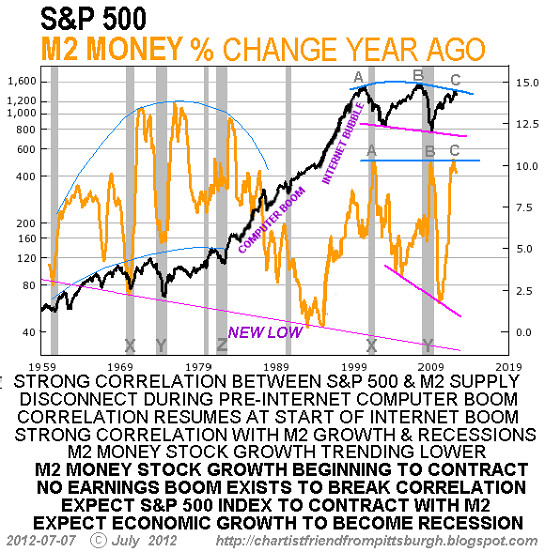As M2 Money Supply Rolls Over, the Stock Market Will Follow
M2 money supply rose sharply, driving the stock market higher. Now it has peaked and rolled over. That does not bode well for the Bull market.

"He who controls the money supply of a nation controls the nation." President James A. Garfield
Except during periods of exceptional earnings growth like we had during the pre-internet computer boom when companies like Microsoft, Oracle and Intel were improving business productivity by leaps and bounds, the trend of the stock market (and economic growth in general) tends to closely follow changes in Fed controlled money supply growth.
The outlier earnings growth of the 1980's and early 90's PC and database revolution was so strong that the Fed was able to take its foot off the monetary accelerator without causing a corresponding drop in stock prices. Once every business was fully computerized in the mid 90's the Fed floored it again to support stocks and create the Internet Bubble. Since then every time the Fed has taken its foot off the M2 accelerator the market trend has turned negative and the economy has gone into recession
That appears to be what is happening right now.
Note the clear correlation of the 1987 crash and the breakdown from a 20-year dome-top of M2 growth that occurred during the late 80's. The two downtrend lines are parallel on the chart.
 Resistance, Revolution, Liberation: A Model for Positive Change (print $25)
Resistance, Revolution, Liberation: A Model for Positive Change (print $25)(Kindle eBook $9.95)
We are like passengers on the Titanic ten minutes after its fatal encounter with the iceberg: though our financial system seems unsinkable, its reliance on debt and financialization has already doomed it.We cannot know when the Central State and financial system will destabilize, we only know they will destabilize. We cannot know which of the State’s fast-rising debts and obligations will be renounced; we only know they will be renounced in one fashion or another.
The process of the unsustainable collapsing and a new, more sustainable model emerging is called revolution, and it combines cultural, technological, financial and political elements in a dynamic flux.History is not fixed; it is in our hands. We cannot await a remote future transition to transform our lives. Revolution begins with our internal understanding and reaches fruition in our coherently directed daily actions in the lived-in world.



























